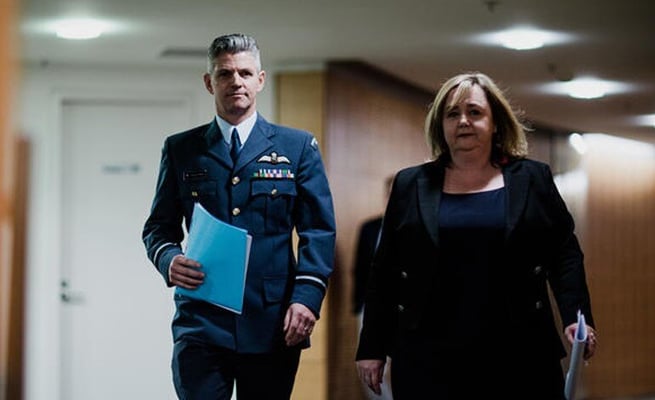Covid-19: NZ's managed isolation system not broken, but under 'extreme stress' - review

A review of the country's managed isolation and quarantine system has found it to be under "extreme stress" and unable to respond to the increasing demands being placed on it as more New Zealanders return home.
Prime Minister Jacinda Ardern ordered the review on June 17 on the same day she announced she was appointing Air Commodore Darryn Webb to conduct the review and oversee border management.
Air Commodore Webb, along with Housing Minister Megan Woods - who has been appointed the minister-in-charge of quarantine and isolation facilities - announced the outcome of the review at Parliament today.
It comes after a number of reports of people mixing and mingling in facilities, people leaving managed isolation without having been tested at all for Covid-19 and members of the public holding events in hotels where managed isolation is taking place.
While the review found the system wasn't "broken'' it revealed the increased number of people returning to New Zealand and going into managed isolation was putting pressure on accommodation facilities and staff were only able to respond to daily challenges.
"The resources required to support the Managed Isolation and Quarantine (MIQ) function have failed to keep pace with the increased volume of returnees. This has resulted in a very dedicated team having to confront immediate issues with limited capacity to plan ahead," the review said.
"This is impacting on staff well-being and the confidence that returnees have in the process."
The review also identified there was an absence of standardised information for those returning to New Zealand and often the first they knew of MIQ was when they had a health check on arrival at the airport.
In many cases returning passengers weren't even aware MIQ was required.
"There have been some notable instances of frustration exhibited by individuals arriving into MIQ, mainly from Australia, who have reportedly been surprised by the 14-day isolation requirement,'' the review said.
That has resulted in a demand for more police presence at facilities.
Other issues identified in the review were flight manifestos not being received until the inbound aircraft departs its overseas origin, which makes planning ahead of flights almost impossible and leaves little time for changes, particularly for flights from Australia.
"There is currently no written information provided to returnees prior to entry or a process to record their acknowledgement that they will be required to enter into the MIQ system,'' the review said.
There is also limited understanding of future demand making it difficult to do any long-range planning of the system.
Issues about the lack of PPE being used on flights, in transit and en route to facilities was also raised and "the environment of the arrivals hall increases the risk of absconding, as well as contact with the families and members of the public, while transferring to coaches", the review said.
"Operational planning is based on numbers alone and does not take into account family groups or cultural needs."
Representatives from the New Zealand Defence Force, police and corrections conducted the review and concluded the location and facilities at the Jet Park Hotel quarantine facility "should be an exemplar" for all managed isolation and quarantine.
"It is well-managed with robust systems in place. However its dual use as an MIF and QF should be reconsidered."
The review also found the decision by Director-General of Health Doctor Ashley Bloomfield to implement mandatory testing on days 3 and 12 from June 9 - the first day of level one - "caused a significant bottleneck in the system and frustration".
"Attempts to prioritise the day-12 samples were unsuccessful due to laboratory constraints.
"It is evident that health check procedures differ between MIFs. There did not appear to be a standard procedure for the accounting of individuals and the daily checking of their health and wellbeing," the review found.
"There were occasions when policy decisions were made with little understanding of the operational consequences.
"These occasions have increased the stress on staff on the ground," the review said.
Woods said a range of improvements are already underway to address issues identified in the rapid review.
"There is no play book for this kind of pandemic. We're one of only a handful of countries in the world to require managed isolation at the border with compulsory testing, making our existing system one of the strictest globally," she said.
"This report shows how we can strengthen the managed isolation system, reduce the room for error and continue to keep Covid-19 at the border and out of our communities.
"The review found that the system is not broken but does need additional resourcing to respond to the increasing demands placed upon it as growing numbers of New Zealanders come home from global Covid-19 hotspots," she said.
"The Ministry of Health will be increasing the number of clinical and non-clinical staff, such as nurses, at each facility to ensure health checks, testing and other health services are consistently delivered to the standards required," Woods said.
Air Commodore Webb last week announced a doubling of the on-the-ground Defence Force staff of 32, across 18 facilities.
"As of today, we have 168 NZDF personnel across 21 facilities providing 24/7 coverage. There are also more government and defence staff across the end-to-end system.
"This increased resourcing has had an immediate impact on the ground in terms of making sure our people are well supported to carry out their roles and ensure the safe transfer of returnees into managed isolation," he said.
Other improvements rolling out now include:
- Increased security for transferring returnees to managed isolation facilities
- The standardisation of procedures across all facilities
- The introduction of better information for returnees - from flight boarding through to entry into New Zealand and their exit from Managed Isolation.
- Better information to communities where those facilities are located.
- Strengthening of demand forecasting, reporting functions and coordination between agencies.
Health responses include:
- More staff in facilities
- Improved model of care - including taking into account issues like mental health and addiction issues
- More clinical oversight to ensure a consistent quality of service in facilities
- Monitoring to ensure there is consistency across facilities
Via rnz.co.nz
A review of the country's managed isolation and quarantine system has found it to be under "extreme stress" and unable to respond to the increasing demands being placed on it as more New Zealanders return home.
Prime Minister Jacinda Ardern ordered the review on June 17 on the same day she...
A review of the country's managed isolation and quarantine system has found it to be under "extreme stress" and unable to respond to the increasing demands being placed on it as more New Zealanders return home.
Prime Minister Jacinda Ardern ordered the review on June 17 on the same day she announced she was appointing Air Commodore Darryn Webb to conduct the review and oversee border management.
Air Commodore Webb, along with Housing Minister Megan Woods - who has been appointed the minister-in-charge of quarantine and isolation facilities - announced the outcome of the review at Parliament today.
It comes after a number of reports of people mixing and mingling in facilities, people leaving managed isolation without having been tested at all for Covid-19 and members of the public holding events in hotels where managed isolation is taking place.
While the review found the system wasn't "broken'' it revealed the increased number of people returning to New Zealand and going into managed isolation was putting pressure on accommodation facilities and staff were only able to respond to daily challenges.
"The resources required to support the Managed Isolation and Quarantine (MIQ) function have failed to keep pace with the increased volume of returnees. This has resulted in a very dedicated team having to confront immediate issues with limited capacity to plan ahead," the review said.
"This is impacting on staff well-being and the confidence that returnees have in the process."
The review also identified there was an absence of standardised information for those returning to New Zealand and often the first they knew of MIQ was when they had a health check on arrival at the airport.
In many cases returning passengers weren't even aware MIQ was required.
"There have been some notable instances of frustration exhibited by individuals arriving into MIQ, mainly from Australia, who have reportedly been surprised by the 14-day isolation requirement,'' the review said.
That has resulted in a demand for more police presence at facilities.
Other issues identified in the review were flight manifestos not being received until the inbound aircraft departs its overseas origin, which makes planning ahead of flights almost impossible and leaves little time for changes, particularly for flights from Australia.
"There is currently no written information provided to returnees prior to entry or a process to record their acknowledgement that they will be required to enter into the MIQ system,'' the review said.
There is also limited understanding of future demand making it difficult to do any long-range planning of the system.
Issues about the lack of PPE being used on flights, in transit and en route to facilities was also raised and "the environment of the arrivals hall increases the risk of absconding, as well as contact with the families and members of the public, while transferring to coaches", the review said.
"Operational planning is based on numbers alone and does not take into account family groups or cultural needs."
Representatives from the New Zealand Defence Force, police and corrections conducted the review and concluded the location and facilities at the Jet Park Hotel quarantine facility "should be an exemplar" for all managed isolation and quarantine.
"It is well-managed with robust systems in place. However its dual use as an MIF and QF should be reconsidered."
The review also found the decision by Director-General of Health Doctor Ashley Bloomfield to implement mandatory testing on days 3 and 12 from June 9 - the first day of level one - "caused a significant bottleneck in the system and frustration".
"Attempts to prioritise the day-12 samples were unsuccessful due to laboratory constraints.
"It is evident that health check procedures differ between MIFs. There did not appear to be a standard procedure for the accounting of individuals and the daily checking of their health and wellbeing," the review found.
"There were occasions when policy decisions were made with little understanding of the operational consequences.
"These occasions have increased the stress on staff on the ground," the review said.
Woods said a range of improvements are already underway to address issues identified in the rapid review.
"There is no play book for this kind of pandemic. We're one of only a handful of countries in the world to require managed isolation at the border with compulsory testing, making our existing system one of the strictest globally," she said.
"This report shows how we can strengthen the managed isolation system, reduce the room for error and continue to keep Covid-19 at the border and out of our communities.
"The review found that the system is not broken but does need additional resourcing to respond to the increasing demands placed upon it as growing numbers of New Zealanders come home from global Covid-19 hotspots," she said.
"The Ministry of Health will be increasing the number of clinical and non-clinical staff, such as nurses, at each facility to ensure health checks, testing and other health services are consistently delivered to the standards required," Woods said.
Air Commodore Webb last week announced a doubling of the on-the-ground Defence Force staff of 32, across 18 facilities.
"As of today, we have 168 NZDF personnel across 21 facilities providing 24/7 coverage. There are also more government and defence staff across the end-to-end system.
"This increased resourcing has had an immediate impact on the ground in terms of making sure our people are well supported to carry out their roles and ensure the safe transfer of returnees into managed isolation," he said.
Other improvements rolling out now include:
- Increased security for transferring returnees to managed isolation facilities
- The standardisation of procedures across all facilities
- The introduction of better information for returnees - from flight boarding through to entry into New Zealand and their exit from Managed Isolation.
- Better information to communities where those facilities are located.
- Strengthening of demand forecasting, reporting functions and coordination between agencies.
Health responses include:
- More staff in facilities
- Improved model of care - including taking into account issues like mental health and addiction issues
- More clinical oversight to ensure a consistent quality of service in facilities
- Monitoring to ensure there is consistency across facilities
Via rnz.co.nz









Leave a Comment